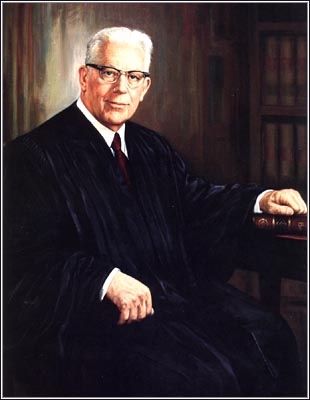 The famous Chief Justice turns 120 this week and the Law Library is having a party in his honor! Come by on Monday at 2:30 p.m. and help us celebrate his full and exciting life.
The famous Chief Justice turns 120 this week and the Law Library is having a party in his honor! Come by on Monday at 2:30 p.m. and help us celebrate his full and exciting life.
Earl Warren said: “Everything I did in my life that was worthwhile I caught hell for.” It seems he was right. Who said: “[He’s] the biggest damned-fool mistake I ever made.”? Read on to find out ….
March 19, 1891: born in Los Angeles, California, the son of Scandinavian immigrants. He grew up in Bakersfield, working summers for the Southern Pacific Railroad where his father was a longtime employee. He later said that his political and legal attitudes were the result of seeing first-hand the lives and struggles of working people.
1912: Received his undergraduate from the University of California, Berkeley.
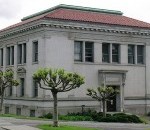 1914: Received his LL.B. degree from Boalt Hall and joined the California bar. He was nowhere near the top of his class and did not make Law Review or win any honors.
1914: Received his LL.B. degree from Boalt Hall and joined the California bar. He was nowhere near the top of his class and did not make Law Review or win any honors.
1914-17: Worked a year for Associated Oil Company and then joined Robinson & Robinson, an Oakland law firm.
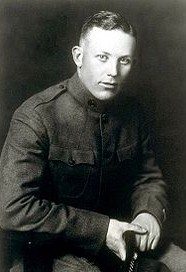 1917: During World War I, Warren enlisted in the U.S. Army as a private, later rising to the rank of first lieutenant. He never served overseas. Rather, since he had become a bayonet expert, he was assigned to teach at the Central Infantry Officers’ Training School at Camp MacArthur in Waco, Texas.
1917: During World War I, Warren enlisted in the U.S. Army as a private, later rising to the rank of first lieutenant. He never served overseas. Rather, since he had become a bayonet expert, he was assigned to teach at the Central Infantry Officers’ Training School at Camp MacArthur in Waco, Texas.
1919: Served as clerk to the judiciary committee of the California Assembly
1919 to 1920: Served as Oakland’s deputy attorney.
1920-25: Served as Alameda County deputy district attorney from 1920 to 1923 and chief deputy district attorney from 1923 to 1925.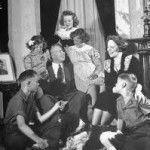
October 14, 1925: Married Nina Palmquist Meyers at the First Baptist Church in Oakland.
1925: Appointed Alameda County district attorney, at a salary of $7,000 a year. Known for cracking down on bootleggers, oil stock swindlers, embezzlers, racketeers, and building and loan sharks, his conviction rate was 86%! Although he had a reputation for high-handedness, none of his convictions were overturned on appeal. A 1931 survey voted listed him as the best district attorney in the country and, by the late 1930s, he was a powerful force in Republican Party politics.
May 14, 1938: Warren’s 73-year-old father was robbed and murdered by an unknown assailant.
1938: Elected California Attorney General. During his tenure, Warren closed ![]() down all the dog tracks in the state and fought against bookies and slot machines. He won a seven million dollar verdict in the U.S. Court of Claims for native Indians under “lost” 1851-1852 treaties. He was also an advocate for the removal of Japanese Americans in order to prevent espionage and sabotage. Later, he would say publicly:
down all the dog tracks in the state and fought against bookies and slot machines. He won a seven million dollar verdict in the U.S. Court of Claims for native Indians under “lost” 1851-1852 treaties. He was also an advocate for the removal of Japanese Americans in order to prevent espionage and sabotage. Later, he would say publicly:
I have since deeply regretted the removal order and my own testimony advocating it, because it was not in keeping with our American concept of freedom and the rights of citizens. Whenever I thought of the innocent little children who were torn from home, school friends and congenial surroundings, I was conscience-stricken.
November 3, 1942: Elected the 30th Governor of California; re-elected in  1946 and 1951. In 1951, he defeated Democrat James Roosevelt, FDR’s son. As Governor, Warren worked for social reform. He desegregated the California National Guard, developed the State Department of Mental Hygiene, and led reforms of the prison system in California by establishing the Board of Corrections under the Prisoner Rehabilitation Act. He also unsuccessfully urged passage of a comprehensive prepaid medical and hospital care program for all California workers and their families, the first in the nation, paid for with a 3% payroll tax.
1946 and 1951. In 1951, he defeated Democrat James Roosevelt, FDR’s son. As Governor, Warren worked for social reform. He desegregated the California National Guard, developed the State Department of Mental Hygiene, and led reforms of the prison system in California by establishing the Board of Corrections under the Prisoner Rehabilitation Act. He also unsuccessfully urged passage of a comprehensive prepaid medical and hospital care program for all California workers and their families, the first in the nation, paid for with a 3% payroll tax. 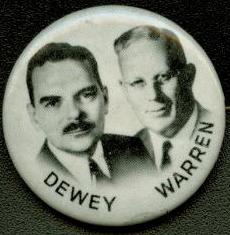
1948: Unsuccessful Republican candidate for vice president under Thomas E. Dewey.
1952: Lost the Republican presidential nomination to Dwight D. Eisenhower.
1953: Appointed 14th Chief Justice of the United States Supreme Court; served 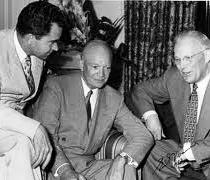 until 1969. President Eisenhower, upon appointing him, said: “He represents the kind of political, economic, and social thinking that I believe we need on the Supreme Court; he has a national name for integrity, uprightness, and courage that, again, I believe we need on the Court.” However, Eisenhower later remarked: “[He’s] the biggest damned-fool mistake I ever made.”
until 1969. President Eisenhower, upon appointing him, said: “He represents the kind of political, economic, and social thinking that I believe we need on the Supreme Court; he has a national name for integrity, uprightness, and courage that, again, I believe we need on the Court.” However, Eisenhower later remarked: “[He’s] the biggest damned-fool mistake I ever made.”
[A] lot of people are of the opinion that the Supreme Court just reached out and grabbed onto those issues and decided them in opposition to Congress … [b]ut, really, all the court was doing was filling a vacuum because Congress had not acted. Earl Warren oral history interview.
 1954: Brown v. Board of Education, 347 U.S. 483. Warren negotiated the unanimous decision and wrote the opinion stating: “We conclude that, in the field of public education, the doctrine of ‘separate but equal’ has no place. Separate educational facilities are inherently unequal.”
1954: Brown v. Board of Education, 347 U.S. 483. Warren negotiated the unanimous decision and wrote the opinion stating: “We conclude that, in the field of public education, the doctrine of ‘separate but equal’ has no place. Separate educational facilities are inherently unequal.”
1954: Hernandez v. Texas, 347 U.S. 475, gave Mexican Americans the right to serve on juries. Warren wrote for the unanimous court: “[I]t taxes our credulity to say that mere chance resulted in there being no members of this class among the over six thousand jurors called in the past 25 years. The result bespeaks discrimination, whether or not it was a conscious decision on the part of any individual jury commissioner.”
1961: Mapp v. Ohio, 367 U.S. 643. Warren was part of the majority that held that the Fourth Amendment applied to the states through the Fourteenth Amendment and, therefore, evidence obtained through an unlawful search or seizure may not be used against the defendant at trial.
1962: Engel v. Vitale, 370 U.S. 421. He again voted with the majority to prohibit mandatory school prayer.
1963: Gideon v. Wainwright, 372 U.S. 335. The Warren Court ruled that the Sixth Amendment right to legal counsel applied to state criminal proceeding through the Fourteenth Amendment and, therefore, indigent defendants must be provided an attorney at no cost.
1963: Griswold v. Connecticut, 381 U.S. 479. Joined in the decision invalidating a Connecticut law prohibiting use of contraceptives on the grounds that it violated the “right to marital privacy.”
1964: Reynolds v. Sims, 377 U.S. 533, dealt with the subject of State Senate apportionment. Warren wrote: “Legislators represent people, not trees or acres. Legislators are elected by voters, not farms or cities or economic interests.”
1964: Appointed by Lyndon Baines Johnson to head the 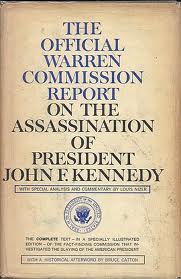 commission investigating the assassination of John F. Kennedy. LBJ told him: “I think this thing is of such great importance that the world is entitled to have [it] presided over by the highest judicial officer of the United States.” The 1964 Warren Commission report concluded that Lee Harvey Oswald was the lone assassin and that there was no conspiracy to kill the president. However, Warren later said: “We may not know the whole story in our lifetime.” Earl Warren interview on assassination and report
commission investigating the assassination of John F. Kennedy. LBJ told him: “I think this thing is of such great importance that the world is entitled to have [it] presided over by the highest judicial officer of the United States.” The 1964 Warren Commission report concluded that Lee Harvey Oswald was the lone assassin and that there was no conspiracy to kill the president. However, Warren later said: “We may not know the whole story in our lifetime.” Earl Warren interview on assassination and report
1965: Miranda v. Arizona, 384 U.S. 436. Warren 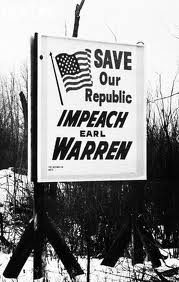 announced a set of warnings that police in state proceedings must give to a suspect in custody before attempting to interrogate him. Warren put teeth into the decision by stating that evidence obtained in violation of these warnings must be excluded from trial. “When an individual is taken into custody or otherwise deprived of his freedom by the authorities and is subjected to questioning…he must be warned prior to any questioning that he has the right to remain silent, that anything he says can be used against him in a court of law, that he has the right to the presence of an attorney, and that if he cannot afford an attorney one will be appointed for him prior to any questioning if he so desires.”
announced a set of warnings that police in state proceedings must give to a suspect in custody before attempting to interrogate him. Warren put teeth into the decision by stating that evidence obtained in violation of these warnings must be excluded from trial. “When an individual is taken into custody or otherwise deprived of his freedom by the authorities and is subjected to questioning…he must be warned prior to any questioning that he has the right to remain silent, that anything he says can be used against him in a court of law, that he has the right to the presence of an attorney, and that if he cannot afford an attorney one will be appointed for him prior to any questioning if he so desires.”
1967: United States v. Robel, 389 U.S. 258. In striking down § 5 (a) (1) (D) of the Subversive Activities Control Act of 1950, Warren wrote: “[T]his concept of ‘national defense’ cannot be deemed an end in itself, justifying any exercise of legislative power designed to promote such a goal. Implicit in the term ‘national defense’ is the notion of defending those values and ideals which set this Nation apart. For almost two centuries, our country has taken singular pride in the democratic ideals enshrined in its Constitution, and the most cherished of those ideals have found expression in the First Amendment. It would indeed be ironic if, in the name of national defense, we would sanction the subversion of one of those liberties – the freedom of association – which make the defense of our nation worthwhile.”
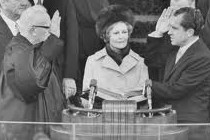 January 20, 1969: Warren had already administered the presidential oath of office to Eisenhower (1957), Kennedy (1961), and Johnson (1965). Now he was to swear in his lifelong political enemy, Richard Nixon.
January 20, 1969: Warren had already administered the presidential oath of office to Eisenhower (1957), Kennedy (1961), and Johnson (1965). Now he was to swear in his lifelong political enemy, Richard Nixon.
June 23, 1969: Resigned from the Supreme Court. Warren originally chose to retire while LBJ was still President in order to prevent Nixon from appointing his successor. However, the Senate refused to confirm the nominee, Abe Fortas, and Warren remained on the Court through the October 1968 term. Nixon named Warren E. Burger to succeed him.
1974: During the Watergate crisis, Warren stated: “If I had ever known what was going to happen to this country — and this Court — I never would have resigned. They would have had to carry me out of here on a plank!”
July 19, 1974: died in Washington D.C. at the age of 83, and buried at the Arlington National Cemetery.
1981: Awarded the Presidential Medal of Freedom.